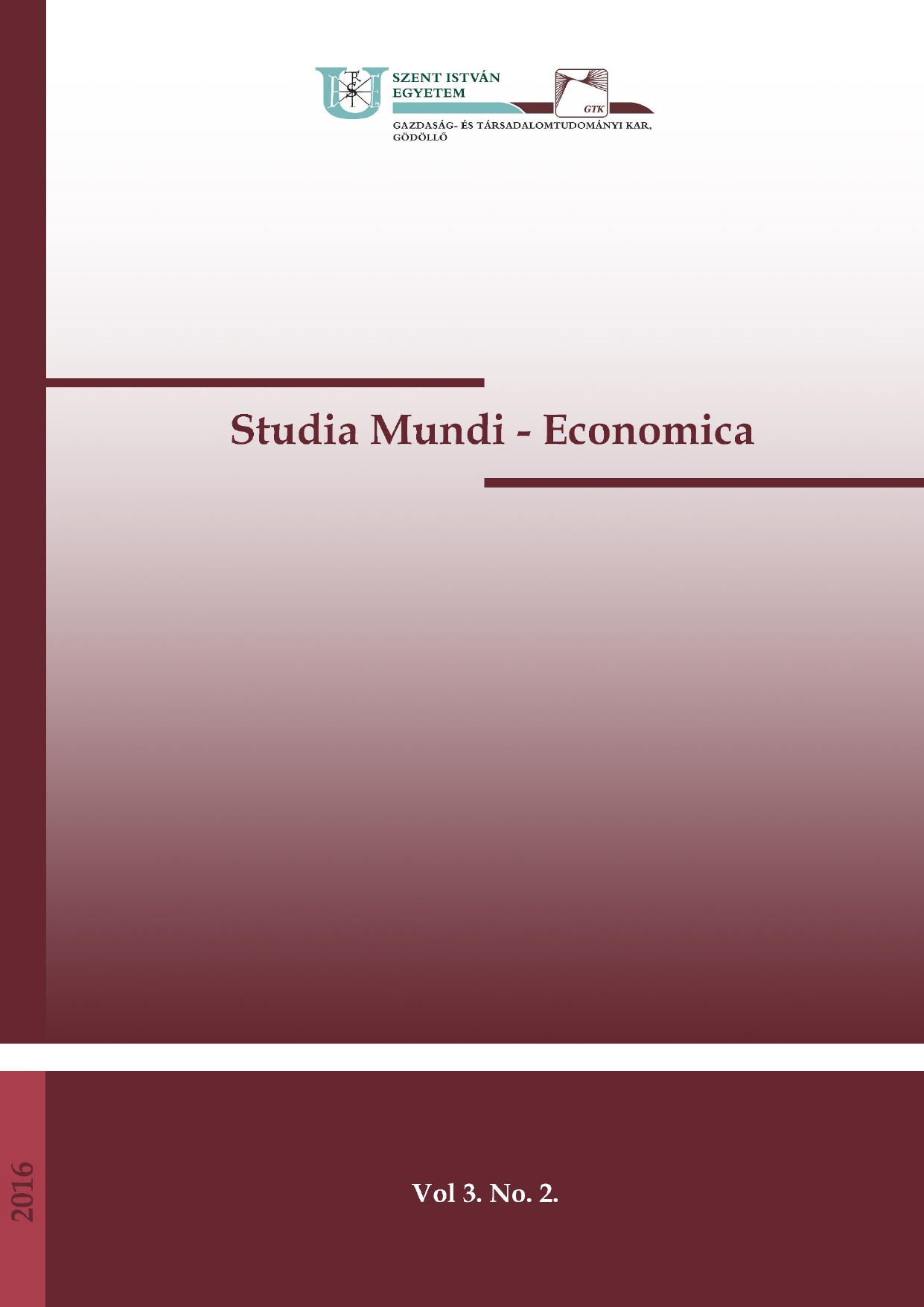Innovációk térszerkezet-módosító hatásainak főbb összefüggései
DOI:
https://doi.org/10.18531/Studia.Mundi.2016.03.02.80-89Kulcsszavak:
régió típusok, regionális stratégiák, innovációs miliő, iparági körzetekAbsztrakt
Az innovációk térszerkezet-módosító hatásai manapság kétségtelenül az érdeklődés középpontjában állnak, mivel a területi különbségek csökkentése elsődleges minden nemzeti kormányzat számára. Mivel már napjainkra a városi élet jellemző problémáit is érintik a területfejlesztés e sürgető problémái, így jelentősen sokan foglalkoznak már ezzel a témával. A jobb gazdasági feltételek és stratégiák iránti vágy egyik alapja az a felismerés volt, hogy folyamatossá válhat a regionális hanyatlás és a térbeli gazdasági, társadalmi válság állandósulhat. Az innovatív fejlesztések mögött egyre inkább az a felismerés rejlik, hogy a nyugat-európai államok területeinek gazdasági bázisát a feszített verseny és a technológiai váltás veszélyezteti. Összességében jól látható, hogy az innovációk bevezetésével megvalósított regionális fejlesztések, hosszú távú megoldásokat adhatnak a térszerkezet változásához.
Hivatkozások
Dicken, P.-Loyd, P. E. (1990): Location in Space. Theoretical Perspectives in Economic Geography, Harper Colins, London.
Dougherty, D. (1996): Organizing for Innovation, in S. Clegg, C. Hardy, and W. Nord, eds., Handbook of Organization Studies, London: Sage, (1996), pp. 424-439.
Downs, G. W.-Mohr, L. B. (1976): Conceptual issues in the study of innovation. Admin. Sci. Quar, Vol. 21, pp. 700-714.
Gáspár, L. (1998): Általános innovációelmélet. Magyar Innovációs Szövetség.
Goda, P. – Tóth, T. (2013): Pókháló- entrópia, mint új rendszervizsgálati megközelítés a területi elemzésekben. Területi Statisztika 53:(2) pp. 169-189.
Havas, A. (1998): Innováció elméletek és modellek. In.: Inzelt Annamária (szerk.): Bevezetés az innovációmenedzsmentbe. Budapet, Műszaki Könyvkiadó.
Korompai, A. (1995): Regionális stratégiák jövőkutatási megalapozása. Budapest, ELTE regionális Földrajzi Tanszék.
Kotler, P. (2000): Marketing Management Millenium Edition. ISBN 0–536–63099-2 BA 993095
Lengyel, I. (2003): Verseny és területi fejlődés: a térségek versenyképessége Magyarországon. JATEPress, Szeged.
Lengyel, I.-Rechnitzer, J. (2004): Regionális gazdaságtan. Dialog Campus Kiadó, Budapest-Pécs.
Malecki, E. J. (1997): How Development Occurs: Local Knowledge, Social Capital, and Institutional Embeddededness. Paper prepared for presentation at the Meeting of the Southern Regional Science Association, Savannah, Georgia.
Marshall, A. (1890): Közgazdaságtan alapelvei (Principles of Economics).
Némediné, Kollár K. – Neszmélyi, Gy. I. (2015): Aspects Of Spatial Economic Processes Of Disadvantaged Areas In Hungarian And International Perspective. ROMANIAN REVIEW OF REGIONAL STUDIES: JOURNAL OF THE CENTRE FOR REGIONAL GEOGRAPHY (ISSN: 1841-1576) 11:(2) pp. 3-18.
Péli, L. (2013): Növekedési pólusok főbb regionális gazdaságtani összefüggéseinek vizsgálata Magyarországon. Budapest: Agroinform Kiadó és Nyomda Kft., 2013., ISBN: 978-963-502-970-9
Porter, M. E. (1990): The Competitive Advantage of Nations. Harvard Business Review.
Rechnitzer, J. (1990): Szempontok az innovációk térbeli terjedésének kutatásához. MTA RKK, Pécs, pp. 48-62.
Rechnitzer, J. (1993): Innovációs pontok és zónák, változási irányok a térszerkezetben. Közgazdasági és Jogi Könyvkiadó, Budapest.
Rechnitzer, J. szerk. (1994): Fejezetek a regionális gazdaságtan tanulmányozásához. MTA RKK, Győr-Pécs, 1994.
Rothwell, R. (1994): Towards the Fifth‐generation Innovation Process, International Marketing Review, Vol. 11 Iss: 1, pp.7 - 31
Schumpeter, J. A. (1912, 1980): A gazdasági fejlődés elmélete. Vizsgálódás a vállalkozói profitról, a tőkéről, a hitelről, a kamatról és a konjunktúraciklusról. Közgazdasági és Jogi Könyvkiadó, Budapest.
Schmookler, J. (1966): Invention and Economic Growth. Harward University Press. p. 332.
Varga, A. (1998): University Research and Regional Innovation. Kluwer Academic Publishers, Boston.
Letöltések
Megjelent
Folyóirat szám
Rovat
License
Copyright (c) 2016 Ökrös Imre; Nagy Henrietta; Káposzta József

This work is licensed under a Creative Commons Attribution-NonCommercial-NoDerivatives 4.0 International License.
A folyóirat Open Access (Gold). Cikkeire a Creative Commons 4.0 standard licenc alábbi típusa vonatkozik: CC-BY-NC-ND-4.0. Ennek értelmében a mű szabadon másolható, terjeszthető, bemutatható és előadható, azonban nem használható fel kereskedelmi célokra (NC), továbbá nem módosítható és nem készíthető belőle átdolgozás, származékos mű (ND). A licenc alapján a szerző vagy a jogosult által meghatározott módon fel kell tüntetni a szerző nevét és a szerzői mű címét (BY).






